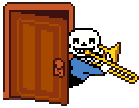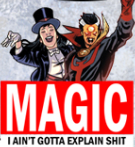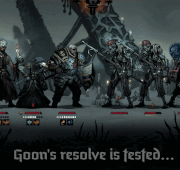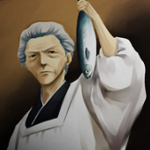|
write words you like, who cares whether theyre good or bad
|
|
|
|

|
| # ? May 15, 2024 16:50 |
|
Mr Gentleman posted:write words you like, who cares whether theyre good or bad i do
|
|
|
|
flerp posted:i do ok then do that then delete all the bad words
|
|
|
|
flerp posted:i do sucks for u
|
|
|
|
My advice is read fiction. Also non-fiction maybe. But read a fair bit and then write and then have people read your writing and tell you the things that are bad about it.
|
|
|
|
Realise that while it can be really helpful, and that it's vital to be inured to strong critique, constant feedback is a crutch you shouldn't rely on.
|
|
|
|
spectres of autism posted:whats some good advice for someone who wants to write fiction? Dr. Kloctopussy posted:Welcome to DocKloc's One Stop Shop for Writing Advice
|
|
|
|
sebmojo posted:Realise that while it can be really helpful, and that it's vital to be inured to strong critique, constant feedback is a crutch you shouldn't rely on. Definitely this- you need to have your own critical eye turned on your work, too. If you don't, it becomes not only impossible to self-edit well, but impossible to differentiate good feedback from bad. And you will get bad, dumb, or just plain "this is my opinion and I am important" feedback. Just because someone can complain about it doesn't mean it's something you have to change. Sometimes people just like to complain about stupid poo poo. I've had someone criticize me for using character names too often in a scene where two women were having a conversation- because, y'know, speaker confusion due to unattributed pronouns isn't confusing, and a using thousand variations of "the ____ woman" to refer to a character isn't infinitely more distracting than just using her name. I also once had someone complain that my "paragraphs aren't long enough" (still the weirdest critique I've gotten) which s probably an infinitely better problem to have than Block Of Text Syndrome. Given that no one since has echoed the sentiment and several people have told me they find my writing much easier to read than the writing of a lot of published authors, I'm kind of inclined to say it's actually the opposite of a problem. The gist of it is this: not all critique is created equal, and you need to know what to look for if you're going to sift the valid from the dumb poo poo.
|
|
|
|
Finish what you start. Any shitbird rear end hat can start a short story or a book. As a new writer, make it your first goal to finish what you started. You'll learn as you go, instead of learn as you start over and over. I speak from unfinished volumes of experience.
|
|
|
|
Finger Wagon posted:Definitely this- you need to have your own critical eye turned on your work, too. If you don't, it becomes not only impossible to self-edit well, but impossible to differentiate good feedback from bad. And you will get bad, dumb, or just plain "this is my opinion and I am important" feedback. Just because someone can complain about it doesn't mean it's something you have to change. Sometimes people just like to complain about stupid poo poo. adding to this, readers have incredibly different tastes; you can see this by comparing the critiques for a single piece in someplace like td (assuming it's not something that's so crap that everyone hates it). some of it is sort of mechanical preferences like what sort of prose someone likes; some of it is whether someone thinks stuff like complete plot arcs are critical or the presence of a conflict + resolution or certain character development etc. are essential pieces; and others are context specific like, e.g., hitting the prompts for td. so you have to be able to take it and use it from the right perspective. Mr Gentleman fucked around with this message at 22:51 on Jun 7, 2016 |
|
|
|
Let's talk about CHARACTER AGENCY. I wrote an astonishing piece over in Thunderdome last week, astonishing in the fact that I finished a story and submitted it. One of the crits was this: A nice person who took the time to read my poo poo and write anything at all about it posted:The ending is a bit of an anticlimax, since the protagonist really didn't have all that much agency in making it happen. I don't understand agency, so I asked the critic to explain it to me. But I take that back now. It's up to me (where possible) to learn poo poo from criticisms, not to make the critic teach me. First step: GOOGLE that poo poo, learn what I can and find HOW it pertains to their crit about my work (HOW, not IF). Even if I think they're way off base, I'm wrong. Somebody read the story, and this is what they thought about it. The best thing I can do is ask myself, "DO I agree? If not, did I INTEND to do what they're saying?" Here's why that's a two-part question. SKIP THIS PART TO GET ON TO AGENCY, because for a moment I discuss why/how to accept criticism instead of getting butt-hurt about it. Another crit was that a lot of my tale lacked description, resulting in (paraphrasing here) "voices in a white room". That kind of writing mistake is a pet peeve of mine, (no descriptions=no mental picture=harder to follow the story), and my initial thought was "PSHAW! I WOULD NEVER..." However, I have to agree with the criticism; there's just no room in my story's 1300 words to add description. I should have edited parts of the story to allow room for description, or I should accepted that it would be voices in a white room. I chose to accept that yeah, I wrote voices in a white room; this was an exercise for me to just finish a goddamn story with a beginning, (MC wants something) a middle, (MC can't get it or is prevented from getting it), and an ending, (MC is changed for the better or the worse, which, surprise, I kind of failed at that as well, and THAT'S WHAT THIS POST IS ABOUT!). AGENCY. My crit said the following (I'm bolding the important words): "The ending is a bit of an anticlimax, since the protagonist really didn't have all that much agency in making it happen." I googled fiction and agency. The first article I found says this: quote:“Agency is a [character's] ability to make purposeful choices.” I.E.: A story is interesting when the MC is interacting with the poo poo that's happening, instead of watching/reporting what happened. Take War Of The Worlds, (the Tom Cruise version). There's a LOT of poo poo happening in that story, and the main character could've hid in his house freaked out while everything goes down. But no, he chooses to grab a car and gfto, which leads him to learn that he's been selfish an a lovely dad and we should all pay attention to our kids a little more, oh and aliens die from the cold. While I thought my MC was making decisions, but upon reflection, I was wrong... he was just doing (choosing) the same things he'd always done. In the end, he's decided he's going to finally make the right choice, but BIG TWIST he just accepts his fate, continuing to make the same, bad choices. In fact, later in the article about agency, there's this: quote:A character who gives up and accepts his/her fate at a critical moment in a story – especially someone who still seems to have choices, but who refuses to do anything about them or make any further moves to achieve his/her goals –loses a lot of readers, even though choosing not to act when one is able is, theoretically, still a choice. It is almost always a huge, horrible let-down when someone who has struggled through half a novel or better, against increasingly heavy odds, decides to give up the fight. So I'm going to stop writing now. I could go on for a long time because my coffee has kicked in before my A.D.D. meds. But here's the two main takeaways from my ramble: - Write a story, but just because YOU know where it's going, your character doesn't. Give them choices that aren't always easy, and have them choose based on what kind of person they are (AGENCY!), (in the early part, based on their flaws, in the later part, maybe, based on what they've learned). - Just because you think a critic missed the point, or is flat out wrong, force yourself to find out why they felt that way. Don't make them TELL you why they felt that way, (if possible). Go find out yourself. In the end, I did find out what my critic was talking about, and exactly the point I wanted to make, and exactly why I was wrong about that point: quote:It is almost always a huge, horrible let-down when someone who has struggled through half a novel or better, against increasingly heavy odds, decides to give up the fight. Okay. And here's a third thing to take away (which is really the most important rule that I've learned since I started writing and posting in here 4 years ago): - LEARN the basic rules, and learn WHY they exist, so the next time you want to break them, you have a clear understanding of why your breaking of that rule is going to work. I hope this helps more than (once again) providing the worst possible advice you could read. magnificent7 fucked around with this message at 14:29 on Jun 10, 2016 |
|
|
|
What's everyone's opinion on bland, generic literary fiction "The ______" titles. I have one for be new thing I'm working on now, but another book already has the same title so I'm not sure anymore.
|
|
|
|
The Interesting Person's Daughter The Interesting Job's Wife The Girl With Traits
|
|
|
|
The Traitor... No, that's a terrible title.
|
|
|
|
magnificent7 posted:Let's talk about CHARACTER AGENCY. Yes! Yes, this. Agency is so important to making a character not only believable, but likeable. There's a reason we like to mock characters like Hamlet and Bella Swan: because they spend so much time dithering in indecision (or lying dramatically on forest floors) that you start wanting to shake them. A few years ago, my friends and I tried to collaboratively write the worst romance novel we could imagine- intentionally inconsistent characterization (sometimes she wasa heaving-bosomed bodice ripper MC, sometimes she was a vegan-leather-converse-wearing hipster in thrifted clothes), hilarious geographical inaccuracies (the mini-pony ranch and dragonfruit farm she called her home was built on a Native American burial ground on the border between Transylvania and Egypt), overwrought plot twists (her love interest was a mummy/werewolf/vampire who had just murdered her parents and she forgave him inexplicably easily, also he had a twin brother who lived in a castle in the forest), and she didn't even have a name- and we still somehow managed to have a character with more agency than Bella Swan. We actively tried to make the most useless MC possible and she still had more agency than Bella Swan. You can make a narrative with a useless main character work, but it's hard- your supporting characters better be strong as hell, interesting poo poo has to be happening around them, and you best not be intending for anyone to like them much. Even in a comical "last sane man" scenario where some poor mook gets swept in the plot unwillingly, sooner or later your LSM has to start doing things or they'll just get annoying. I still have a lot of the stories I wrote when I was really young (I'm talking like eleven to thirteen) and this is one of the huge things that defined my writing at the time- if you were the same kind of kid I was, you were so used to people making your decisions for you that you didn't really understand agency and couldn't imbue your characters with it in any meaningful way. And here's the thing: being a kid with no say in your own life is boring as hell to experience. So why would anyone want to read that? (Unless you're writing a sobering tale of modern ennui meant to make people feel empty inside, I guess.) Edit: change my name posted:What's everyone's opinion on bland, generic literary fiction "The ______" titles. I have one for be new thing I'm working on now, but another book already has the same title so I'm not sure anymore. I think that really depends on the title itself. I have a "The ________" title, but it works for my genre and content. If you're going to call something, say, "The Girl Next Door" or "The Dream She Dreamed" or "The One Who Got Away" you stumble into the pitfall of combining bland "The ______" titles with overused idioms, which gives you a Forgettable Generic Title multiplier of like... ten. Finger Wagon fucked around with this message at 16:22 on Jun 10, 2016 |
|
|
|
change my name posted:What's everyone's opinion on bland, generic literary fiction "The ______" titles. I have one for be new thing I'm working on now, but another book already has the same title so I'm not sure anymore. I don't mind them. They're innocuous and sort of invisible, which is a good reason not to have one, imo. Just don't swing the pendulum too far the other way and go with the Noun of/for Noun and Incongruous/Slightly More Obscure Noun construction currently favored in titling short stories.
|
|
|
|
magnificent7 posted:Let's talk about CHARACTER AGENCY. this is a good post
|
|
|
|
agency is pretty easy. have your characters do something, even it it's the wrong thing. have your characters try, even if they fail. if somebody comes up to your char and says "lets go on an adventure!" your char sucks. if somebody comes up and your char says "lets go on an adventure" then they are p great
|
|
|
|
Sick burn on Bilbo outta nowhere.
|
|
|
|
Moddington posted:Sick burn on Bilbo outta nowhere.
|
|
|
|
General Battuta posted:The Interesting Person's Daughter A title I've had in mind for a long time and would love to write a story for is The Gay Gardner's Wife.
|
|
|
|
Moddington posted:Sick burn on Bilbo outta nowhere. Frodo's a better protagonist anyway
|
|
|
|
yeah bilbo kinda sucks at the start and is a whiny bitch. the dwarves and gandalf are fun. then when bilbo gets the ring and starts to actually do poo poo he gets better.
|
|
|
|
Szmitten posted:A title I've had in mind for a long time and would love to write a story for is The Gay Gardner's Wife. The Wendigo's Wife The Girl with the Syrup Tattoo
|
|
|
|
magnificent7 posted:Let's talk about CHARACTER AGENCY. This is great, and you make some especially good points about how to take criticism, which I think is an important skill for all writers to learn. You don't have to agree with all criticism, but if you dismiss it without attempting to understand it, you are missing out on a chance to improve.
|
|
|
|
Dr. Kloctopussy posted:This is great, and you make some especially good points about how to take criticism, which I think is an important skill for all writers to learn. You don't have to agree with all criticism, but if you dismiss it without attempting to understand it, you are missing out on a chance to improve. While this is very true (as are all the comments to the same effect above) I think the one problem is it sort of operates on the assumption that we're all goony pieces of poo poo who respond to criticism with "  you just don't understand my AUTHORIAL INTENT" which isn't the case. If you're like me, and have the problem of taking criticism too seriously, you end up finding yourself stressed out over how many times you used "he" to start a paragraph in a scene because somebody decided to point it out. you just don't understand my AUTHORIAL INTENT" which isn't the case. If you're like me, and have the problem of taking criticism too seriously, you end up finding yourself stressed out over how many times you used "he" to start a paragraph in a scene because somebody decided to point it out.All criticism should be considered, yes, but some criticism just straight-up isn't worth the same time and dedication to improvement that other criticism is. Taking everything equally seriously is not only overwhelming, it's a massive waste of time. I think the key is, ultimately, a balance between trusting your own ability and being able to accept and internalize criticism.
|
|
|
|
Finger Wagon posted:All criticism should be considered, yes, but some criticism just straight-up isn't worth the same time and dedication to improvement that other criticism is. Taking everything equally seriously is not only overwhelming, it's a massive waste of time. I think the key is, ultimately, a balance between trusting your own ability and being able to accept and internalize criticism. This is where, I think, getting multiple perspectives on something you've written can be very helpful. If one person says something, that may just be a personal reaction that doesn't necessarily reflect on you at all. If three or four people are saying the same thing, then it's time to listen.
|
|
|
|
I have two stories on the shortlist for the National Flash Fiction Day competition here in New Zealand. Today I was on a community radio show reading them. Here's a link for anyone interested: http://www.accessradio.org/Player.aspx?PID=22c349a0-f66a-4df5-ac05-1946c0290091&autoplay=false&height=300
|
|
|
|
newtestleper posted:I have two stories on the shortlist for the National Flash Fiction Day competition here in New Zealand. Super cool, newt! Congratulations!
|
|
|
|
Ziji posted:Looking for a bit of general advice for a first time writer. I have written short stories before as a kid, but this is my first story I have written with any serious intent to finish. Some days I would get on a writing kick and spend a few hours starting something, it would grow to a thousand words or so and then I never finish it or I delete it because I don't like it. I also have a LOT of trouble with plot structuring, excessive exposition, and dialogue. Most stories I had written contain no dialogue because I find it hard to bridge conversations in writing. Another issue I find myself having is that when I write, I usually make it up as I go along instead of having a "blueprint" I follow. This feels natural to me, but I feel like it sometimes leads to entire paragraphs of pointless information or fluff that ultimately doesn't make the cut and I've wasted a bunch of time. Anything you put into a draft stays in til the end of the draft. It's easier to cut and polish than it is to add.
|
|
|
|
On a similar note to the most recent discussion, how do you go about revising a complete novel draft? Do you read the whole thing and markup small and large changes? Do you start over but keep chunks you like?
|
|
|
|
Halbey posted:On a similar note to the most recent discussion, how do you go about revising a complete novel draft? Do you read the whole thing and markup small and large changes? Do you start over but keep chunks you like? I have been struggling with this for a long time (in part because of fits and starts, but also b/c I wasn't sure how to wrap my head around such a big piece of writing). I think that this process, like ALL editing, is going to end up being very individualized. What has kinda been working for me is the following: 1) Read and make notes on the big things that need to be changed (plot meandering, characters behaving inconsistently, characters being annoying when you didn't mean them too, etc.). I paid someone else to do this for me, and don't regret it. She made suggestions that I might not have noticed myself. If you have someone else who is willing to read it, get notes from them, too. 2) Figure out how you are going to make the changes you want. Do you need to change a character's decision? Modify a subplot? These might be pretty big changes. Figure out how they will all work together. I ended up cutting several scenes and adding new ones. For this I just made a note in Scrivener "probably delete" and for new scenes, a blank scene with a short note describing what needed to happen. I have scene notes like this for every scene. I don't think most people do, so YMMV. 3) Write new scenes, make big changes in existing scenes (big change = action happens different, character makes different decision/has different reaction). Basically, you want to get every scene to happen the way it's supposed to, even if the words aren't right yet. What I have just figured out works for me is to take ALL my various scene notes for a scene (which have invariably been added to as time went by and I had new ideas) and organize them into a single coherent scene description. This is the blue print for the scene and the scene needs to include every part of it. Rewriting one scene usually results in new notes for other scenes, too.... Figuring out how to accomplish 2 and 3 is what has been making this really difficult for me. I think what I have just described will work for me long-term. 4) Make the words right. Dialogue flows, action is well-described, atmosphere is developed, stylistic choices are made. 5) Make the words extra-right. Tweak, Tweak, Tweak. Good time to read things out loud to check sentence flow. 6) Proof-read. Of course, you should correct any spelling/punctuation/grammar mistakes you see as you go along, but now's the time to really pay attention and double check! This is pretty close to the process I posted about for shorter stories earlier: http://forums.somethingawful.com/showthread.php?threadid=3495955&pagenumber=158&perpage=40#post450390915
|
|
|
|
After a long time where I've done no writing whatsoever, I'm trying to get back in the habit for the purpose of writing some horror short stories or longer fiction, and possibly a horror podcast down the line. In the interest of doing anything whatsoever rather than paralyzing myself with planning and analysis (which I'm prone to), I just started writing a short story the other day, and have managed to keep the habit going for a while. As has been recommended multiple times in the thread, I'm not concerning myself with quality or it being a good story, really, I'm just putting words to paper and trying to finish something. That said, though, I'm kind of at a point of wondering where the heck this story is going and how I'm going to wrap it up. Is it worth stopping and plotting out the storyline in a more formal way, given that this is my first story in a long time, or should I just trust my gut, finish it out, learn what I can from it, and move onto the next one?
|
|
|
|
|
Thunderdome is probably the answer to your particular dilemma.
|
|
|
|
MockingQuantum posted:After a long time where I've done no writing whatsoever, I'm trying to get back in the habit for the purpose of writing some horror short stories or longer fiction, and possibly a horror podcast down the line. In the interest of doing anything whatsoever rather than paralyzing myself with planning and analysis (which I'm prone to), I just started writing a short story the other day, and have managed to keep the habit going for a while. As has been recommended multiple times in the thread, I'm not concerning myself with quality or it being a good story, really, I'm just putting words to paper and trying to finish something. That said, though, I'm kind of at a point of wondering where the heck this story is going and how I'm going to wrap it up. Is it worth stopping and plotting out the storyline in a more formal way, given that this is my first story in a long time, or should I just trust my gut, finish it out, learn what I can from it, and move onto the next one? sincerely, i dont know man. like my method is usually just like go into a story and just write it in a couple days (probably just one day because thunderdome) and then maybe edit it and make it better if i like it/got good feedback and then do another one but like, that's not how everyone works. so you have to figure out what you think is best because what i do works for me but it might not work for you. so if you need to, go back and try to outline some stuff or w/e you do because honestly, imo, the only bad writing method is one that doesnt make words. so as long as you are making progress on a story, then that should be good enough. you just have to figure out what works for you and that might require some experimentation and beating your head against a brick wall and what not.
|
|
|
|
MockingQuantum posted:After a long time where I've done no writing whatsoever, I'm trying to get back in the habit for the purpose of writing some horror short stories or longer fiction, and possibly a horror podcast down the line. In the interest of doing anything whatsoever rather than paralyzing myself with planning and analysis (which I'm prone to), I just started writing a short story the other day, and have managed to keep the habit going for a while. As has been recommended multiple times in the thread, I'm not concerning myself with quality or it being a good story, really, I'm just putting words to paper and trying to finish something. That said, though, I'm kind of at a point of wondering where the heck this story is going and how I'm going to wrap it up. Is it worth stopping and plotting out the storyline in a more formal way, given that this is my first story in a long time, or should I just trust my gut, finish it out, learn what I can from it, and move onto the next one? Don't sweat the details, just get busy. If you struggle to finish things, start with a very short format. Nothing's set in stone. Pick something and try it. If it doesn't work out, do it again differently, or try something else.
|
|
|
|
Two options: either write raw, then go back and mercilessly edit so everything makes sense. Or plan out, write, and then go back and edit slightly less mercilessly but still without a whole lot of mercy anyway.
|
|
|
|
Cool, thanks for the advice all. Probably going to power through to the end and take some quality time to rip it apart, then judge whether I'm interested enough to actually refine it or just move on to the next bad thing.
|
|
|
|
|
So this is probably a dumb question, but just want to make sure I'm not a rude rear end. Obviously the standard protocol when receiving a rejection is to not respond. But what if a mag shoots you a message saying they want to hold your story for further consideration? Is it kosher to shoot back with a "Thanks for the update, look forward to hearing your verdict," or should you keep to the usual code of silence? Granted, acceptance or rejection probably won't hinge on whether I respond or not, so this might be a moot point.
|
|
|
|

|
| # ? May 15, 2024 16:50 |
|
Yes, you reply to that to tell them that you're okay with them holding it. And it's fine to add that you look forward to hearing from them.
|
|
|




























